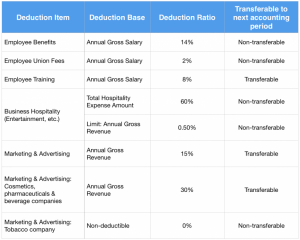Expense claims in China must follow certain guidelines in order to avoid paying taxes on otherwise tax-deductible business expenses. The most common mistakes resulting in unnecessary tax payments come from how fapiaos and supporting documents are collected as well as how the book expense claim deductions.
A typical tax bill for improper handling of expense claims are often 0.5 – 2% of a company’s annual revenue including fines. These kinds of tax bills often catch business managers off guard and can create serious cash flow problems for the businesses and hurt the profitability of the business.
It is the responsibility of the small business to accurately calculate its tax liability and make sure all of its supporting documents and bookkeeping is done correctly in order to avoid such an event. In case of a tax audit, the small business will be fined 0.5 times to 5 times the unpaid amount in addition to the amount of tax owed for inaccurately reporting its tax liability.
The mistakes that resulted in an unexpected tax bill can often be avoided with standard procedures for controlling the collection of fapiaos and correct booking of expenses by the accountant.
It’s worth mentioning that all foreign owned companies in China are subject to mandatory annual audit for tax clearance purposes. For this reason, it is especially important for foreign companies to follow expense claim deduction regulations in order to minimize their tax liability.
Collection Of Expense Claims
A large percentage of required additional tax payments are the result of poor collection and documentation of otherwise legitimate expenses. A missing fapiao, repeated fapiao, fapiao for activities irrelevant to the business and fapiaos with incorrect business tax ID or legal entity name are considered to be unqualified fapiaos and are therefore unable to be deducted from a company’s income for Corporate Income Tax purpose.
It is the responsibility of the small business to catch any of the above issues before accepting the expense claim and deducting the amount from the taxable income of the business.
Here are some suggestions for handling the common occurrences that put a company at risk in the expense claim process;
Missing Fapiao
A large percentage of missing fapiaos are ones which were never received. Upon receiving a fapiao, the staff should upload a photograph or scan of the fapiao to its expense claim system in order to keep track of what has been received and what hasn’t. It then becomes much easier to identify which fapiaos have been received, and misplaced, and which ones have not yet been received.
In case a fapiao is truly missing, the employee should request the supplier or vendor to reissue the fapiao and cancel the previous one to avoid double taxation.

Image: 喜报销 expense claim feature & upload feature
Duplicate or Fake Fapiaos
A duplicate or reissued fapiao is most likely to occur with electronic fapiaos. The QR in the top left corner of an official fapiao can be scanned using expense claim management software to look up the specific fapiao in the government database to check its authenticity. Most expense claim software also remembers whether the accountant has reimbursed the employee for this expense in the past to avoid reimbursing multiple times for the same expense.

Image: 喜报销 fapiao scanning and authentication feature
Unrelated Expense claims
Claiming an unrelated expense claim in China is seen as tax evasion if it is used to reduce the taxable income of the company or the employee’s. Most often it is services such as consulting, training, conference fees or rentals which attract the attention of tax authorities. To prove the relevance of an expense, the business must keep supporting documents in case of a tax audit. This includes scans of a landlord’s ID and Certificate of Property ownership, rental contracts, an employee training contract, and consulting contracts.
Software features help improve the approval process internally allowing supporting documents to be uploaded and stored along with expense claims themselves. However, if audited, the tax authorities will always request to be presented the original documents and neither a digital copy or photo copy will suffice.
Incorrect Tax Info
If the companies legal name, tax ID or description on a fapiao is incorrect or incomplete, it cannot be deducted from a business’ income and is treated the same as a missing fapiao. Additionally, rental fapiao’s must include the name and location of the property on the fapiao. It is up to the accountant to take notice and ask the supplier to reissue the fapiao with the correct information so that it can be claimed by the business.
Allowances and individual employee benefits for expats must include the expatriates full name and government ID number in addition to the full fapiao information mentioned above in order to qualify as a non-taxable income for their Individual Income Tax Return.
Booking Expense Claim Deductions
Expenses in China come with certain limits based on a company’s annual gross revenue or the annual gross salary of employees for which they can be deductible for corporation income tax purpose. Any amounts beyond these limits will become non-deductible and incur 25% corporate income tax for the company. Not tracking these limits is the easiest way to pay unnecessary corporate income tax on otherwise deductible expenses.
Below is a chart of limits for expense claim deductions for corporate income tax for companies in China.

The most common mistake is for accountants to book an employee’s meal expenses as a “business hospitality expense”, which will quickly lead to exceeding the deductible expense limits. However, some of the meals expenses should be booked as “travel expenses” or “employee benefits” etc.
As most of these limits are tied to non-fixed amounts such as revenue and employee salaries, accountant must use software to monitor these balances in real time in order to avoid exceeding these limits.
An unexpected tax bill can be devastating to a company’s cash flow and hurt its profitability. Implementing clear and consistent procedures for handling expense claims preemptively is the responsibility of business owners and CFOs to avoid such negative results.
In part two of this two part series, we look at how to manage internal processes for handling expense claims.





